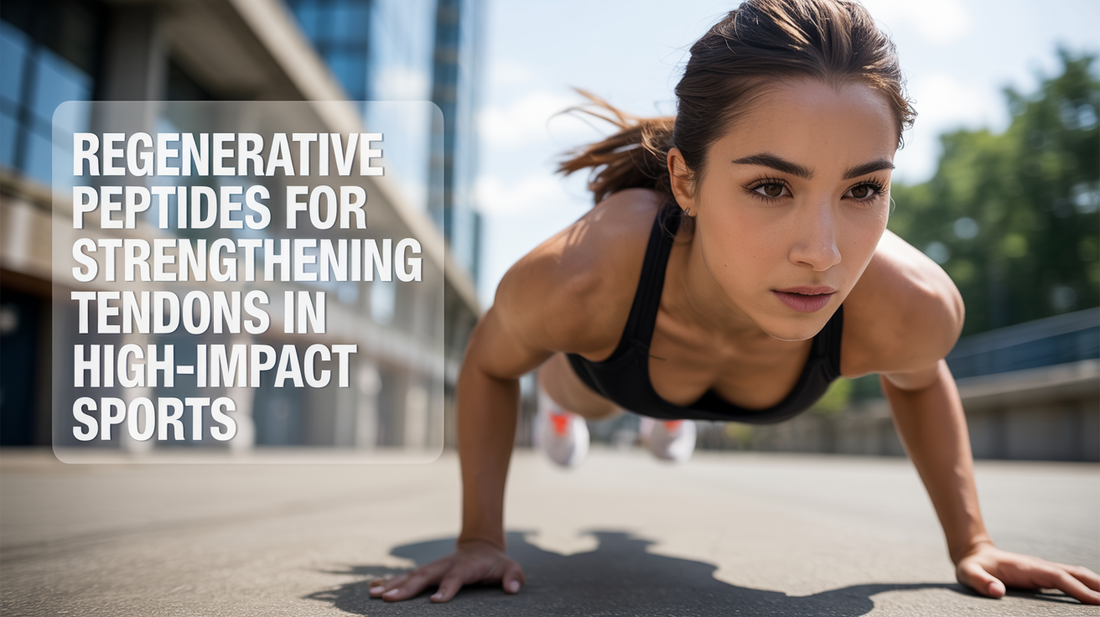
Regenerative Peptides for Strengthening Tendons in High-Impact Sports
Share
Regenerative peptide therapy offers athletes in high-impact sports a way to strengthen tendons, reduce injury risk, and support long-term performance. By enhancing tendon resilience and repair, peptides make it possible for athletes to train harder, recover faster, and sustain peak performance over time.
The Tendon Challenge in High-Impact Sports
High-impact sports such as basketball, soccer, gymnastics, and tennis place repetitive stress on tendons. These tissues are slow to heal due to limited blood supply, making athletes prone to chronic injuries like tendinitis, tendinosis, or even ruptures. In addition, athletes in track and field, martial arts, and volleyball often report tendon overuse issues that limit their training capacity. The constant jumping, sprinting, and rapid changes of direction all accumulate stress on tendon structures.
- Repetitive strain weakens tendon fibers, increasing the likelihood of microtears and cumulative damage over time.
- Limited healing capacity delays recovery, forcing athletes into prolonged downtime or reliance on physiotherapy interventions.
- Reduced elasticity impacts flexibility, explosive performance, and the ability to perform quick pivots or jumps.
- Recurring injuries can shorten athletic careers if not properly addressed, creating psychological stress and uncertainty about long-term performance.
- Chronic inflammation builds up when tendons do not fully recover, leading to pain, stiffness, and long-term degeneration.
These challenges make tendon health a crucial focus for athletes seeking longevity in their sport. Addressing tendon strength proactively is not only about recovery from injuries but also about preventing future setbacks and allowing athletes to perform at their highest level year after year.
How Regenerative Peptides Strengthen Tendons
Peptides such as BPC-157 and TB-500 play a vital role in supporting tendon healing and resilience. They accelerate cellular repair processes, stimulate growth factors, and enhance blood vessel formation within connective tissues. Studies suggest that when combined with structured training and proper nutrition, peptides may help rebuild damaged connective tissues faster than natural recovery alone.
✅ Boost collagen synthesis for stronger tendon fibers capable of withstanding repetitive load and high-impact stresses.
✅ Increase angiogenesis (new blood vessel growth) to improve nutrient and oxygen delivery to tendons, supporting faster recovery.
✅ Enhance fibroblast activity to accelerate tissue regeneration and repair at the cellular level.
✅ Reduce inflammation to minimize pain, improve mobility, and prevent chronic overuse conditions.
✅ Support long-term durability so tendons can endure repeated stress across competitive seasons without breaking down prematurely.
Benefits for Athletes in High-Impact Sports
Incorporating regenerative peptides into recovery protocols provides significant advantages for professional and recreational athletes alike:
- Reduced risk of tendon injuries, lowering chances of ruptures and chronic conditions that limit training.
- Faster recovery times between intense matches or training sessions, allowing consistent participation in practice and competition.
- Improved mobility and flexibility, supporting explosive jumps, rapid sprints, and dynamic lateral movements.
- Greater training consistency with fewer breaks caused by tendon-related setbacks or overuse issues.
- Extended career longevity, giving athletes confidence in their connective tissue strength and resilience.
- Enhanced performance sustainability, ensuring athletes can peak repeatedly throughout competitive seasons without burnout.
Safety and Considerations
- Medical guidance is essential: Use should be supervised by healthcare professionals with experience in sports medicine.
- Quality sourcing matters: Trusted suppliers ensure product purity, authenticity, and compliance with sports regulations.
- Personalization is key: Dosage and frequency may vary depending on an athlete’s unique needs, training load, and history of tendon stress.
- Integration with training: Peptides work best alongside strength training, mobility work, and proper recovery strategies.
The Future of Tendon Health in Sports
As the physical demands of high-impact sports continue to rise, regenerative peptides are emerging as a valuable tool for athletes. By reinforcing tendon strength and resilience, they help athletes stay in the game longer, recover more effectively, and reach new levels of performance without compromising long-term health. The next generation of sports recovery will likely combine regenerative therapies, data-driven training, and personalized peptide protocols to safeguard tendon health and extend athletic careers.
